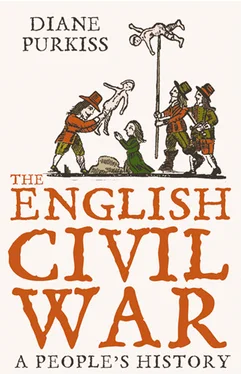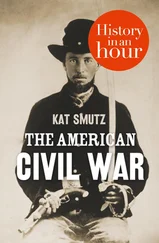She tried to keep a record of news, a daily chronicle. She didn’t write down what she felt, but only what happened. Her first three entries for 1645 read:
The first of Janua. Mr John Hotham was beheaded on Tower Hill.
The 2nd of Janu Sr John Hotham (father to Mr Hotham) was beheaded on Tower Hill.
The 10 of January My Lord of Canterbury was beheaded on Tower Hill and was buried at Barking Church
Interspersed with the doings of the great she recorded events crucial to her:
The 8 Feb I came to Peckham great with child, and ride all the way a horseback, and I thank God had no hurt
The 6 of March [1645], between one and two in the morning I was brought to bed of a boy, the 7 he was christened and named Charles, the gossips [godparents] were my brother Charles and Francis Twysden and my Lady Astley [wife of Jacob Astley]
The 11 of March there was the terriblest wind, that had been known since ever the like, it did a great deal of hurt
The 3 of April a little before 3 in the morning my sister Twysden was brought to bed of a girl at Maling, it was christened the 5 and named Ann, without gossips … the new way.
It might seem incongruous that Isabella recorded this mass of detail about her baby’s christening and her niece’s christening in a war diary, but she did so because domestic details like this had themselves become battlefields. In particular, the baptism of babies had become caught up in the political divisions the war had created. Many families of traditional views were made miserable by the difficulty of getting vulnerable infants baptized by their preferred rite. As George Thomason amassed a collection of over a hundred tracts on the question of infant baptism, worried parents tried to do their own homework, anxiously poring over the Bibles and pamphlets much as modern parents might agonize over vaccination. In 1646, when their child was born, John and Lucy Hutchinson took some time to decide, but eventually chose not to have the new baby baptized, whereupon, Lucy wrote, they were reviled as sectarians. The Directory of Public Worship, which replaced the prayer book in 1645, dispensed with the sign of the cross, and the minister was told bluntly to sprinkle the child’s face ‘without adding any other ceremony’. Godparents were also ruled out firmly, and instead the child was presented by its father. Some people accepted this philosophically. Still others rejoiced at the opportunity to choose adult baptism, and found names for themselves that reflected their faith. But the diarist John Evelyn loathed it, and had his babies christened at home, according to the old rite, while he continued to act as godparent for friends who felt the same.
This is how war and other such large events are experienced: Isabella juxtaposes Fairfax’s capture of 4000 soldiers at the pivotal battle of Naseby in 1645 with worries about the money owed to the baby’s monthly nurse, who is leaving for London. For her, the personal and the political are well blended. My intention is to achieve the same mix in this book. This method has its drawbacks, as Isabella’s diary shows; the stories that result can seem to jump about, and strict chronology is sometimes sacrificed to the writer’s interest in particular events. But it is truer to how this war was felt. There was not one Civil War, but thousands, different for each person involved.
So large impersonal changes such as constitutional reforms are important but only because they are eventually experienced by people. I found Charles Stuart much more interesting than absolutism, Oliver Cromwell more compelling than Puritanism. And neither man is helpfully summed up by a list of his beliefs, because both were also feeling human beings, inconsistent and emotional, and so were all those who fought alongside them.
The story of the Civil War begins with the world before the cataclysm. The group of people who were to play great roles in the enormous events to come were in 1639 leading lives that seemed to them normal. There were political struggles, there was murmuring and discontent, but these disputes were well within the realm of normality. True, there had been a war with Scotland, and matters there were still not settled. But there had been such wars before. There was nothing to suggest that the nation was about to be violently torn in pieces by the most costly armed conflict in its history. Even the two protagonists, Charles and Cromwell, could have no inkling of what was coming.
By focusing on a morning in the late winter of 1639, we can catch a glimpse of those last moments of unthinking normality. On that morning Charles I was hunting. The king loved hunting on horseback, and loved it far more than the tedious obligations that came with rule. When on a progress, a tour to meet his subjects, Charles would sneak off to the chase rather than remain to shake the lord mayor’s hand. On a cold morning, a winter’s morning, the horse and the freshly killed game both steamed lightly, the heat of their bodies drowning out the scent of trodden leaves. For Charles, his horse was more interesting and less demanding company than his subjects; it did not rush up to him with importunities he did not understand, did not beg for his touch to heal it of nauseating diseases. It served him and knew its place – and so did those who rode with him. Through hunting Charles could feel connected with his father, James I, who had also loved the chase, but who had not very greatly loved Charles. And he could feel absolute – absolutely confident that the still-vast royal forests belonged to him and no one else. In those forests were deer that had been bred by his royal predecessors, Henry VIII and Elizabeth I, as well as his father. The forests were also still dangerous, full of wild boar. In their leafless and endless embrace, Charles need not fear having to treat with anyone. He ruled all he saw. And at just a year short of forty, his grip on power had become tight and remorseless.
His future foe, Oliver Cromwell, loved to hunt on horseback too, and like Charles, a winter morning in 1639 might have found him at the chase. We can picture both, then, crouched over the carcass of a slain deer, ceremoniously dividing the venison for various people: their fellow-hunters, those who were due a gift, the hunt servants. This picture to us suggests mess, but to Charles and Cromwell it would have meant order, the comforts of ritual. Bloody and dangerous as hunting could be, it was a moment for all gentlemen to feel in control of the world, like God looking over his creation on the seventh day of rest. An important metaphor for Cromwell, for ever since his extreme depression in his middle twenties, religion had become his reason for living. Now a man of forty, he had put his turbulent youth firmly behind him. But he still loved the chase. The experience of hunting yoked the gentry to the aristocracy; it made gentlemen feel like rulers.
Middle-class town dwellers like John Milton had other interests. Milton loved books. On a winter’s morning in 1639, he would have been at his desk or in his library, reading, writing, thinking. He liked to get up early, working or studying until dawn. He had only the slender light of a candle to illuminate and warm his small dark parlour. He did not order a fire, despite the cold; Milton was not a poor man, but he was not a rich one. At thirty-one, he did not have what his father might have called a proper job, and by 1639 he had published only one poem. But he already knew that he would be the greatest English poet in history. His Latin was so good that he could, literally, write like Horace and Ovid; he knew the epics of Homer and the tragedies of Euripides by heart. Now he had just come back to England after a Grand Tour of Italy, and was writing an elegy in Latin for his only real friend, who had just died. During the war, Milton would have many associates, but no real intimates; the conflict would both further and thwart his passionate ambition.
Читать дальше












